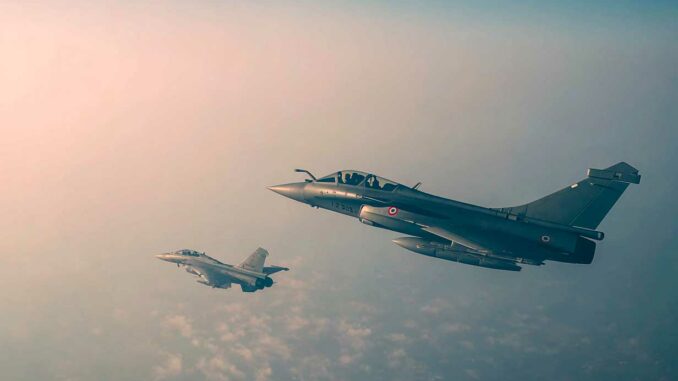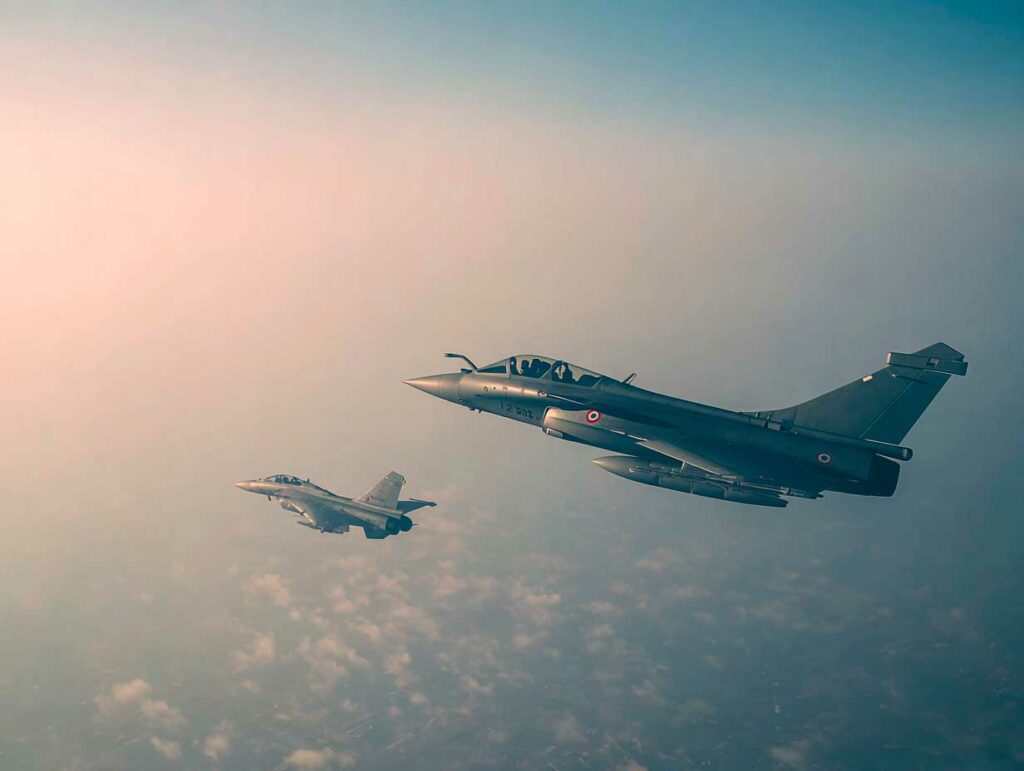
Paris suspects China of conducting a secret operation to undermine Rafale export sales, particularly in Indonesia.
A serious accusation with strategic implications
According to recent revelations from French intelligence, Beijing has allegedly conducted a structured and clandestine disinformation campaign against Dassault Aviation’s Rafale. The operation is said to be aimed at undermining the reputation of the French multi-role fighter in several importing countries, including Indonesia, in order to promote Chinese alternatives such as the J-10C. This campaign is not improvised: it is said to rely on diplomatic channels, anonymous websites, fake social media accounts, and direct pressure on foreign officials. French intelligence services describe it as an offensive, concerted strategy in line with the rise of the Chinese defense industry.
The nature of this operation, as described by Agence France-Presse and the AP, is not unprecedented in the world of military intelligence. But it is distinguished by the direct involvement of Chinese diplomatic networks, including certain embassies, in disseminating or relaying negative content. The target: markets in Southeast Asia, the Middle East, and Africa, where competition in the aerospace industry is fierce and highly political.
In a tense international context, this case raises questions about the information security of European manufacturers. It also calls into question Chinese influence practices in arms sales.
A targeted Chinese influence strategy
Use of embassies as vectors
Documents provided to the French authorities indicate that certain Chinese embassies actively participated in this campaign. The agents identified allegedly relayed content disparaging the Rafale to political and military leaders in countries that are partners of France. These messages focused on the aircraft’s reliability, its allegedly complex maintenance, and its cost-effectiveness.
In Jakarta, members of the Indonesian government were reportedly approached directly. Flawed technical and budgetary arguments were reportedly circulated during negotiations on the 42 Rafale jets ordered by Indonesia in 2022 for approximately $8.1 billion. However, these claims were unfounded: they cast doubt on Dassault’s ability to deliver on time and on French logistical support.
Disinformation via the media and social networks
Another major component of the operation was the dissemination of anonymous articles and biased content on obscure online platforms. These publications, often in English or Indonesian, attacked the alleged obsolescence of the Rafale or referred to fictitious incidents. The tone varied, but the technical accusations were consistent: lack of high-performance AESA radar, stealth flaws, and exorbitant operating costs.
At the same time, several accounts on X (formerly Twitter) and Facebook relayed this content, artificially creating a debate about the relevance of acquiring Rafale jets. Some of these accounts used AI-generated profile photos and reproduced language similar to that used in official Chinese publications.
The goal: to push for the J-10C
The aim was not only to slow down French sales, but also to directly promote the Chinese J-10C. This light fighter, derived from the Su-27 and equipped with local technology (including the KLJ-7A radar), is regularly offered at low cost, with options for partial technology transfer. China is promoting it as an “equivalent” alternative to the Rafale, particularly in Southeast Asia and Africa.
By targeting the Rafale’s reputation, Beijing aims to position its aircraft as credible solutions in a context where it is still struggling to break into the high-end segment against the F-16V, Rafale, and Typhoon.

Commercial and geopolitical repercussions
The impact on Paris-Jakarta relations
China’s strategy has had tangible consequences. In Indonesia, several politicians have expressed temporary doubts about the viability of the Rafale program, even though the contract was signed in February 2022. The six-year delivery schedule has sparked rumors of a blockage or partial resale, all of which have been denied by the Indonesian Ministry of Defense.
The French Embassy in Jakarta played a crucial role in countering these allegations and reestablishing direct channels with the local Ministry of Defense. French diplomatic intervention was stepped up at the end of 2023, with increased support from the DGA and Dassault Aviation.
Intensified industrial rivalry
On the commercial front, this case illustrates the growing rivalry between French and Chinese aircraft manufacturers. In 2024, China offered J-10Cs to several African states at prices 30 to 40% lower than those of Western aircraft, according to DGA estimates. These offers often include long-term payment facilities, the construction of local maintenance units, and loans backed by Chinese state banks.
Faced with this situation, France must redouble its efforts to preserve its markets. Dassault benefits from the technical superiority of the Rafale (Snecma M88 engine, AESA RBE2 radar, NATO interoperability), but its purchase and maintenance costs remain higher, at around $80 to $90 million per unit.
An acknowledged information war
The general context is one of an increasingly open information war, in which industrial powers no longer hesitate to deploy hybrid strategies combining cyber warfare, influence and diplomacy. The French accusations against Beijing come at a time of heightened tensions, with a resurgence of incidents in the South China Sea and direct competition in several arms markets.
France has not yet officially named any third countries in its public statements, but documents consulted by several media outlets clearly indicate China’s direct involvement. The French Foreign Ministry has not ruled out discreet diplomatic retaliation, including tougher export conditions for Beijing in sensitive sectors.
War Wings Daily is an independant magazine.